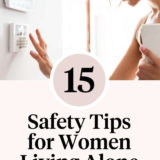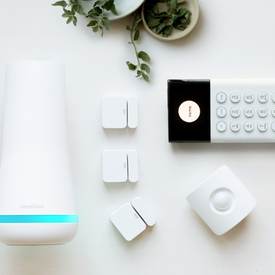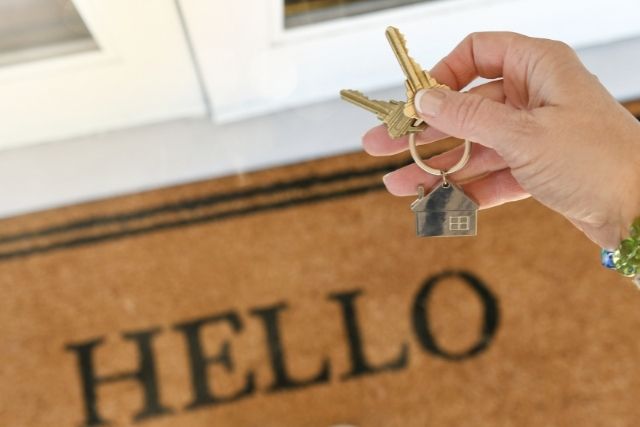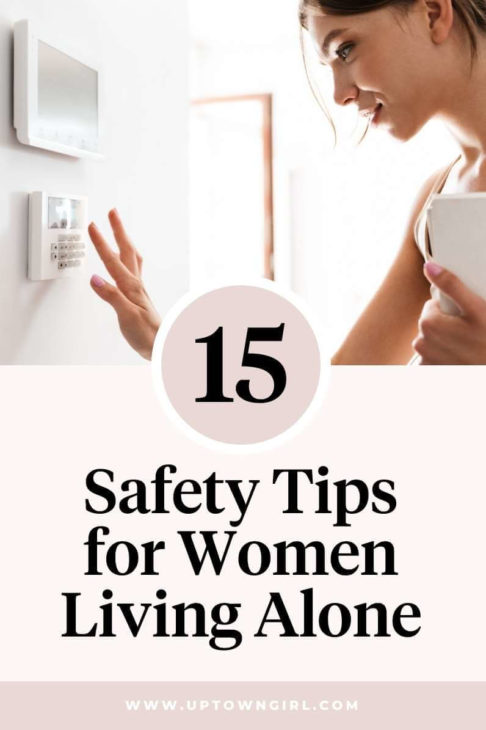15 Safety Tips for Women Living Alone

Erika Marie is a fashion and beauty writer as well…

Every 26 seconds, a break-in occurs in the United States. If you live alone, you are probably aware of the potential dangers and may be searching for solutions to stay safe.
Whether you live alone or with children, these 15 safety tips for women can help keep you protected.
1. Never Post Your Location on Social Media in Real-Time

Next time you’re on vacay, you may consider posting your photos on social media. Updating your status to, “In the Maldives for a week!” sends a signal to a would-be burglar that not only is your home unoccupied, but they have plenty of time to steal your belongings.
If you absolutely must share your vacation photos, do so after you’re home.
Generally speaking, it’s a good practice not to share your current location on social media at all. Whether you’re at a resort in Cancun or your local sushi restaurant, resist the temptation to share your current location with the world. Doing so makes you a target to be robbed or attacked.
2. Install a Security System
A security system is your first defense against intruders. Avoid the use of phony security company decals, signs, and inoperable cameras. Potential intruders know they’re fake, and worse yet, they do not function in an emergency.
A system such as SimpliSafe is an affordable and effective solution for renters as the installation is easy without drilling or complicated wiring. SimpliSafe offers 24-hour monitoring and no contracts.

3. Lock Doors, Windows, and Gates
This tip may seem obvious for an article on safety tips for women, but a study reveals as many as 46% of Americans do not lock their doors. Keep your doors locked, whether you are home or away. Same for windows, side doors, and gates.
If you rent an apartment or house and the doors and windows don’t lock, contact your landlord immediately and request a repair.
4. Keep Your Keys Out and Ready
When approaching your front door, have your keys in your hand and ready to use. Spending time fumbling through a handbag leaves you vulnerable to attacks.
5. Close Blinds and Curtains at Night

Leaving your blinds and curtains wide open at night is dangerous. Potential robbers can scan your home for valuables and see you’re alone.
Your curtains may look like they provide privacy, but how much? Test them out by standing outside and peering through your windows at night. You may be surprised at how much you can see. Replace them with blackout curtains if necessary.
6. Leave the Lights On
Whether you’re away for an evening or a few days, having lights on in your home can dissuade someone from breaking in. You can use a timer to program your lights to come on at certain intervals when you’re not home.
7. Take a Self-Defense Class
If you’re attacked in or outside your home, you’ll need to get away from your assailant quickly. Self-defense classes teach situational awareness and how to disable an attacker. You may not have a black belt in martial arts, but these techniques could save your life.
The YMCA offers affordable self-defense classes. Remember to bring a friend or two!
8. Do Not Open the Door to Strangers

This tip is drilled into our heads from childhood but bears repeating. Even if you have security cameras, you should avoid opening the doors for unexpected visitors. This includes uniformed delivery drivers or any person regardless of how clean-cut or attractive they are.
Address strangers through the door. Don’t reveal that you are home alone. If a stranger asks to leave literature or a package, tell them to lay it on your doorstep. Don’t open the door until you are sure they have left.
Never open a suspicious package. If the package is missing a return address, is leaking fluid, has a strange odor, or makes noise, contact the authorities immediately.
9. Keep a Heavy Chair in Your Bedroom
Although robbers prefer to target properties where the owners are away, home invasions occur. If the unthinkable happens, a heavy chair can be used as a barricade. Interior doors are often not as sturdy as exterior doors. A chair placed under the doorknob or up against the door can give you enough time to call 911.
Practice barricading your door with a friend’s help. If they can push through the door easily, you’ll need to keep searching for a heavier chair.
10. Adopt a Dog
Not only are dogs great companions, but they are also a deterrent to thieves. A barking dog can be enough for a thief to avoid your home.
11. Lock Doors While Transporting Packages

You may have to make multiple trips to the car when carrying several grocery bags. Always lock your door in between trips. This is inconvenient if you live in an apartment, but it only takes a second for a stranger to slip into your place while you grab that final bag from your trunk.
12. Keep Your Address Private
Your home address should be a closely guarded secret. Never reveal your address or neighborhood to strangers or casual acquaintances.
If you are conducting a transaction in public and need to confirm your address, hand the clerk your ID, or offer to write it down on a piece of paper. Never recite your address loud enough for others to hear.
When online dating, never let your date know where you live. Insist on meeting in public a few times while you get to know them.
13. Hide Your Valuables
Keep your jewelry, cash, and other valuables out of sight from visitors.
There are several usual hiding places in your home – a freezer, a flour canister, even the top of your kitchen cabinets.
Hollowed-out books make great makeshift safes. Valuables can also be hidden in tampon boxes or the closet of a child’s bedroom.
14. Keep Your Name off the Mailbox and Callbox
Under no circumstance should your name be placed on your mailbox. Adding your name puts you at risk to scammers, stalkers, or robbers.
Ditto for callboxes. Apartments and condos occasionally have callboxes designed for visitors to reach you from downstairs. If the manager requires a name, ask if you can use a pseudonym or variation of your real name for safety reasons.
15. Never Keep a Spare Key on Your Property

If you’re prone to misplacing your keys, you may hide a spare set to avoid getting locked out. This practice is dangerous and gives a robber easy access.
Leaving a spare key under your welcome mat, under a potted plant, or above the door jamb are areas thieves look at while trying to break in. Don’t make their job easier!
Keep your spare keys away from your home and preferably with a trusted neighbor, friend, or family member.
Conclusion
These safety tips for women are not intended to instill fear or create paranoia. An attack or robbery can happen to anyone regardless of gender or age. It’s important to adopt preventative measures to safeguard your home. Keep this page bookmarked and begin implementing these practices as soon as possible.
Save the image below to Pinterest so you can come back later!

Erika Marie is a fashion and beauty writer as well as a hardcore vintage clothing enthusiast. In her free time, she can be found thrifting for hidden gems to add to her collection.






